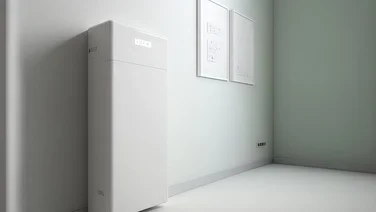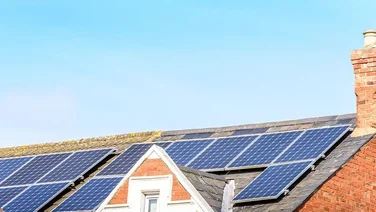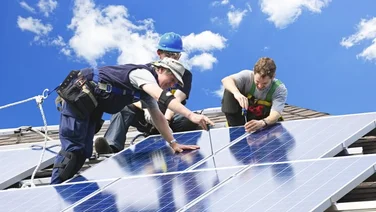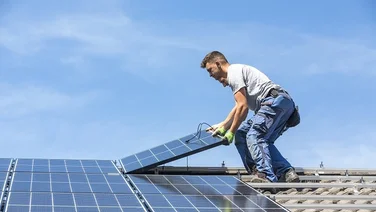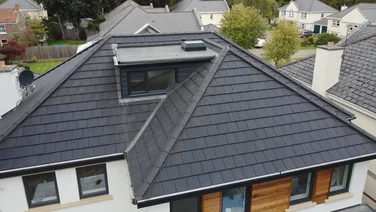We receive a small fee from trusted installers when you request a quote through our site. This helps us keep our content independent, well-researched and up to date – Learn more
✔ Sharp’s solar panels are above average
✔ But they’re well short of industry leaders like SunPower and REC
✔ Sharp first made solar cells in 1963
Considering how many types of solar panels there are, you’ll want to choose a reliable, high-quality brand to buy your panels from. Using our comprehensive list of the 12 best solar panel installers in the UK will also help you find the right installer for those panels.
Sharp are among the most popular brand in the UK, so it makes sense that you or your installer will have them on a shortlist – but before you decide, you’ll want to find out how good Sharp’s panels really are, how their prices compare, and the warranty options on offer.
Fortunately, we’ve done all the work for you.
We can also help you to compare solar panel prices. All you have to do is provide a few quick details, and our expert installers will be in touch with free quotes for you to compare.
Where do you want to install solar panels?
Get started
Who is Sharp?
Tokuji Hayakawa founded the Japanese electronics company that would eventually be called Sharp in 1924, calling it Hayakawa Kinzoku Kōgyō (Hayakawa Metal Manufacturing).
Hayakawa used the Osaka-based business to sell his inventions, including an adjustable belt buckle, crystal radio, and mechanical pencil called the Ever-Ready Sharp.
In 1970, Hayakawa renamed the company after this pencil, meaning Sharp solar panels – which were first sold in 1963 – are older than Sharp.
In 2014, Sharp stopped producing and selling solar panels in the US. It still sells panels in Europe, Africa, Asia, Australasia, Central America, South America, and the Middle East.
Sharp’s solar panel range explained
In the UK, Sharp sells seven rooftop solar panels for domestic properties, as well as two panels for ground-mounted installations and six panels for commercial use.
All of Sharp’s panels are sleek, black products with black or white frames, which is the standard style at the moment.
Half-cell technology
Sharp’s solar panels all come with half-cell technology, which the company started using in 2020, after REC introduced the development in 2014 and brands including Jinko, Longi, and Trina followed suit.
It means that each cell – the small squares you’ll see on each solar panel – is now half the size of a regular cell, while the panel itself is now divided into two parts and comes with three small junction boxes on the back, instead of one.
This allows the current to travel less distance at any one time, which means you’ll lose a lower amount of energy during the process.
Sharp also claims that this makes its solar panels last longer, which can only be properly tested over time – but it makes sense in theory.
If you want more information about investing in solar power for your home, read our solar panels costs page.
Where do you want to install solar panels?
Get startedAre Sharp solar panels any good?
Sharp’s solar panels are above average quality for the industry as a whole, but fall behind the best solar panels on the market.
And Sharp’s environmental goals, incorporated in its Eco Vision 2050, are promising but vague, with very few well-defined targets.
Next to Panasonic’s bold aim to reach net-zero emissions by 2030, it seems inadequate.
Efficiency
All Sharp’s domestic panels have efficiency ratings between 19.73% and 21.25%.
Most of them are more efficient than the market average of 20%, which means you can save more money on your energy bills with Sharp solar panels than you would with most other panels.
However, they’re inferior to market leaders like SunPower, Yingli, REC, Jinko, and Panasonic, which all sell solar panels with efficiency ratings above 22%.
Power
The company’s offerings have peak power outputs that range from 365 Wp to 415 Wp.
This is higher than the 350 Wp industry average, but means Sharp again falls behind most of its competitors, which largely sell at least one solar panel with a peak power output of 430 Wp or above.
It’s useful for most homeowners to be able to generate more solar power from the same amount of roof space – and Sharp doesn’t offer this possibility to the level of other companies.
Warranty
Sharp provides a 15-year product warranty on its solar panels in the UK, which is disappointingly low for a multinational corporation, positioning it behind most of its rivals.
Its performance warranty offers customers a guaranteed 85% efficiency level from their panels after 25 years, which is underwhelming, considering rivals including Panasonic, REC, and SunPower all guarantee 92% efficiency after 25 years.
What’s Sharp’s best solar panel?
Sharp’s best solar panel is the NUJC415B.
This model, which comes in a black frame with a white backsheet, has a peak power of 415 Wp, which is the highest Sharp offers for domestic properties.
In the UK, that means you can expect this panel to generate 313 Wh per year, on average – 18% more than an industry average 350 Wp panel, which produces 265 Wh per year here.
The NUJC415B’s efficiency rating is 21.25%, which is well above the 20% average for residential panels, but only middling when it comes to comparing it against the best products.
It comes in at a relatively light 20.7 kg, and is about 5 cm smaller than the average solar panel – which makes all the difference sometimes.
For the top domestic solar panels across the industry at the moment, read our Best Solar Panels page.
Next steps
You now have everything you need to make an informed decision on Sharp’s solar panels.
The next step is to find out how much you’d pay for solar panels, which involves comparing the cost of Sharp’s panels against others across the industry.
Thankfully, it’s easy to compare solar panel prices, with our help. Just provide a few quick details, and our expert installers will be in touch with free quotes for you to compare.
FAQs
Does Sharp still make solar panels?
Sharp does still make solar panels, though it stopped producing solar panels at its factory in Wrexham and across the US in 2014.
The company now makes solar panels in Thailand and Vietnam.
Sharp still sells panels across Europe, Africa, Asia, Australasia, Central America, South America, and the Middle East.
Why did Sharp stop selling solar panels in the US?
Sharp stopped selling solar panels in the US in 2014, as part of a major overhaul of its business meant to tackle the rise of low-cost Chinese rivals.
This involved shutting down less profitable parts of the company, including solar panel production at its factory in Memphis, Tennessee – which led Sharp to stop selling solar panels across the US too.
That same year, Sharp also stopped making solar panels at its factory in Wrexham, Wales. Both factories still exist, and make products including microwave ovens – but not solar panels.
How long do Sharp solar panels last?
Sharp says it offers “solar modules that are built for 30 years of high performance.”
However, this is vague phrasing – the company doesn’t explain what high performance means, for instance – so it’s better to look at the warranties on offer.
Sharp currently hands out a 15-year product warranty to UK solar panel customers, and a performance warranty that guarantees 85% of the panel’s initial effectiveness after 25 years.


